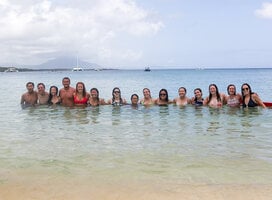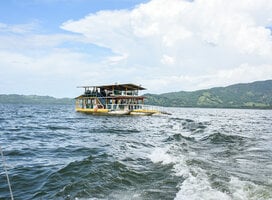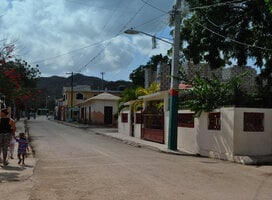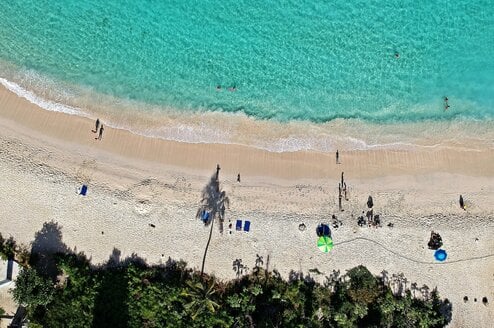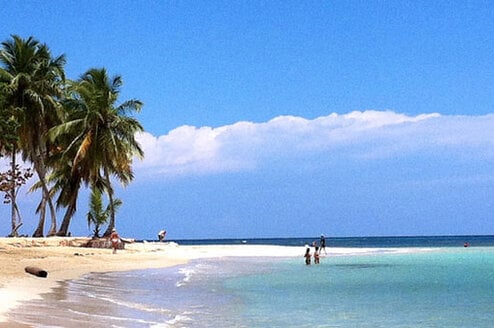High School Abroad in the Caribbean
When people think of the Caribbean, they imagine a dreamy island destination. Clear water, sandy beaches, and a sunny sky are a few things that most people won’t turn down. Imagine being able to go to such a place and also say you did it in high school.
While the beautiful picturesque natural beauty is a pull factor for many students, other important things are not to be forgotten. The Caribbean is home to a variety of languages, including Spanish, French, English, and Dutch -- just to name a few. This is because it was colonized in the past by several different countries. While it has had a tough past, this has led to an abundantly diverse present-time (and probably a fruitful future!)
The Caribbean is best for students who: want to experience life in a developing country while being immersed in rich history in a beautiful location and are interested in language or service-learning programs.
Volunteer
Due to the Caribbean’s economic development, it's very popular for volunteering and service learning programs for high schoolers. In much of the Caribbean, local populations lack some important necessities in life, such as quality education, healthcare, and environmental resources. You would be able to help locals while learning about development issues in these different areas in a truly hands-on experience.
Travel Programs
With at least 28 island nations and more than 7,000 individual islands in the Caribbean, teen travel programs have a lot of space to explore in. This is a great option if you have a limited amount of time (say spring break, winter break, or some time over the summer) and want to explore many different places. Who could blame you; it's hard to pick one location in such a gorgeous area of the world!
Study Abroad
Lastly, another option is to study abroad in the Caribbean (either through an exchange program or short-term program). This is a fabulous option for students who really want to learn more about the culture or histories of the location where they are going, or spend a few weeks immersed in an intensive language course. You can also earn academic credit this way.
Popular Countries
With so many islands to choose from, it will be hard to narrow it down. However, most high school students tend to go to the Bahamas, Puerto Rico, or the Dominican Republic. Cuba has also recently become a popular option, especially for American students.
Student Visa Requirements
Visa requirements vary from country to country in the Caribbean. Your best bet is to check early about the requirements that you might or might not need. You can check with your program provider or institution, as well as the embassy or consulate. Usually, citizens of Canada, the EU and the US don’t need visas for visits of under 90 days throughout the area, but you should always double check this as things are always changing.
Housing
Where you stay will depend on the nature of your travel experience. If you are studying in one location you will most likely be with a host family or in a dormitory if you're affiliated with an institution.
If you're moving around as part of a teen travel program, you'll likely be staying in hotels or hostels. Keep in mind that since the Caribbean is a developing area, the amenities will be very simple (but sufficient!)
Costs
Generally, the Caribbean is a fairly inexpensive place to travel. However, costs for academics, homestays, and meals might add up. On average, a meal will cost around $10 at a restaurant. On the bright side, these might all be included in your program cost. Make sure to see what is provided and what might not be. You might end up not needing any extra cash during your entire stay there, but if you do, it is better to be prepared.
Packing Tips
It is usually hot, hot, hot in the Caribbean, so pack accordingly! In addition, it can get pretty humid. To keep comfortable in this weather make sure to bring:
- T-shirts or tank tops
- Bug spray
- Sun screen
- Sunglasses
- A swim suit
- A reusable water bottle
- A headlamp (in case of power outages and night hikes!)
Health
Before assuming that there may not be any vaccinations necessary, you should consult with your physician at least four weeks before leaving for the Caribbean. You want to make sure you are taking all the necessary precautions.
Mosquito-borne illnesses are usually not a significant concern on most of the islands except during dengue fever outbreaks. Be sure to keep up with this information. Bring plenty of bug spray to keep the bugs away in the first place in case an outbreak occurs just before you leave or while you are there.
Safety
Because of the wealth disparity in the Caribbean, it can be tricky to know which places are safer than others. Overall, you should always be careful and alert and make sure to always check travel advisories before you go!
One fairly common annoyance is stray dogs. While they might seem cute and friendly, do not pet them. You don’t know if they are aggressive or if they are carrying any diseases (like rabies).
